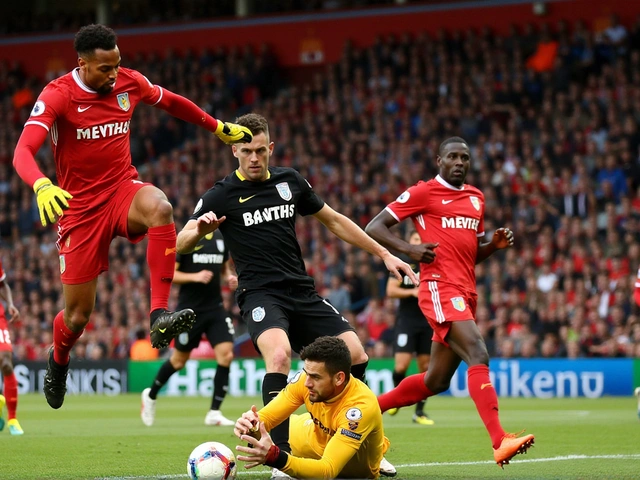
The Early Years and Transition to Coaching
Sven-Goran Eriksson was born on February 5, 1948, in Sunne, a small town in Sweden. From an early age, Eriksson showed a keen interest in football, which led him to play for several local clubs, including Torsby, Sifhälla, and Karlskoga. His playing career, however, was unfortunately cut short by an injury at the age of 27. This injury, while devastating, became a turning point in Eriksson's life, leading him to begin a remarkable career in coaching.
In 1977, Eriksson began his coaching journey with Swedish club Degerfors IF. His aptitude for tactical awareness and ability to inspire players quickly set him apart. From Degerfors, he moved to manage IFK Göteborg, where he achieved significant success. Under his guidance, the club won the UEFA Cup in 1982, a victory that catapulted Eriksson into the international spotlight.
Achievements Across Europe
Eriksson’s managerial skills were soon sought after by clubs across Europe. He went on to manage Portuguese club Benfica, where he led them to multiple league titles. His time in Portugal was followed by a successful stint in Italy, where he managed both AS Roma and Fiorentina. However, it was with Lazio that Eriksson achieved some of his most memorable successes, including winning Serie A, the UEFA Cup Winners' Cup, and the UEFA Super Cup.
Eriksson’s achievements in club football were marked by his ability to adapt to different playing styles and cultures. This adaptability was evident in the variety of teams and leagues he managed, showcasing his versatility and deep understanding of the game.
Leadership of National Teams
In 2001, Eriksson took on one of his most high-profile roles as the manager of the England national team. During his tenure, Eriksson led England to three major tournament quarter-finals: the 2002 FIFA World Cup, UEFA Euro 2004, and the 2006 FIFA World Cup. Despite not advancing beyond the quarters, Eriksson was praised for his calm demeanor and strategic mind.
After leaving the England post, Eriksson continued to manage national teams with spells at Mexico, the Ivory Coast, and the Philippines. Each role presented unique challenges, but Eriksson's extensive experience allowed him to navigate them with a composed and effective approach.
Memorable Moments at Manchester City
In the 2007-08 season, Eriksson took the reins at Manchester City. Although his time at the club was brief, it was marked by significant achievements. One of the highlights was City's first league double over rivals Manchester United in 38 years. Eriksson's influence was felt immediately as he installed a sense of discipline and cohesion within the team.
Supporters of Manchester City remember Eriksson fondly for his contributions during that transformative season. His ability to get the best out of players and his strategic planning on the pitch left a lasting impression.
Eriksson's Global Reach
Eriksson’s managerial career took him to ten different countries, an impressive feat that few managers can claim. His diverse experiences equipped him with a unique perspective on football management. His travels included stints in countries as far removed in footballing culture as China, the United Arab Emirates, and Thailand.
Wherever he went, Eriksson's courteous demeanor and strong leadership style earned him respect. He was known not only for his footballing mind but also for his ability to build strong relationships with players and staff.
A Lasting Legacy
The football community has deeply felt the loss of Sven-Goran Eriksson. Tributes have poured in from clubs, players, and football associations worldwide. Manchester City and Leicester City, among others, have highlighted his invaluable contributions to the sport.
UEFA also paid homage, emphasizing Eriksson's remarkable achievements and the lasting impact of his work on European football. His legacy is defined by both his trophy haul and the respect he garnered from the football world.
Reflections on a Storied Career
In reflecting on Eriksson's career, it’s clear that he was more than just a manager; he was a pioneer who navigated the complexities of football management with grace and intelligence. His journey from a small town in Sweden to the upper echelons of international football is a testament to his dedication and love for the game.
As we remember Sven-Goran Eriksson, we celebrate a life dedicated to football and the numerous lives he touched along the way. His legacy will continue to inspire future generations of footballers and managers, ensuring that his contributions to the sport will never be forgotten.









Yo fam, Eriksson's journey is the ultimate case study in strategic capitalisation-talk about a mentor who turned a career‑ending injury into a global coaching empire! His tactical lexicon was next‑level, blending Scandinavian discipline with continental flair. The way he orchestrated that Lazio double‑trophy run? Pure alchemy. Respect the hustle, respect the legacy.
Eriksson never truly earned the England job; his achievements were mere flash‑in‑the‑pan.
Enough with the rose‑coloured nostalgia!!! Eriksson was a product of the old‑guard elite-hand‑picked by the football establishment to keep the status‑quo intact!!!
When we dissect the tapestry of Eriksson's career, we uncover a dialectic between adaptation and identity. Each club he touched became a laboratory where culture intersected with tactics. His legacy invites us to question how much of a manager is a chameleon versus a catalyst.
It is with measured reflection that I acknowledge Mr. Eriksson's contributions to the sport. His tenure across multiple national teams demonstrates a commendable breadth of experience. The decorum he consistently exhibited merits due recognition.
Eriksson's coaching record exhibits a clear pattern of incremental improvement, leading to measurable successes across various leagues. The statistical data supports his reputation as a methodical manager.
Reflecting upon the monumental career of Sven‑Goran Eriksson, one cannot help but be struck by the sheer breadth and depth of his influence upon modern football. From his humble beginnings in Sunne, Sweden, to the towering heights of leading multiple national sides, his trajectory reads like a saga chronicled across continents. The early adversity of a career‑ending injury at twenty‑seven lent him a perspective that is scarcely found among his contemporaries, fostering a resilience that would define his managerial ethos. In the reserves of Degerfors IF, he honed a tactical acumen that blended rigidity with creativity, a hybrid that would become his signature. When he took the helm at IFK Göteborg, the UEFA Cup victory in 1982 was not merely a trophy but a declaration of Swedish football's emergent potency on the European stage. His subsequent tenure at Benfica revealed an ability to navigate the cultural intricacies of Portuguese football, securing multiple league titles and cementing his status as a versatile tactician. Transitioning to Italy, Eriksson’s stints at AS Roma, Fiorentina, and particularly Lazio, demonstrated a capacity to adapt to the intricate chessboard of Serie A, guiding Lazio to a Serie A crown, a Cup Winners’ Cup, and a Super Cup, each triumph a testament to his strategic flexibility. The appointment as England manager in 2001 placed him under an unprecedented microscope, with every decision dissected by a relentless press corps; yet, through three major tournaments, he delivered consistent quarter‑final appearances, underscoring a steadiness rarely afforded to his predecessors. After England, his ventures with Mexico, the Ivory Coast, and the Philippines highlighted a willingness to embrace diversity, confronting linguistic barriers and varying footballing philosophies with a composed professionalism. Moreover, his brief yet impactful spell at Manchester City, culminating in a historic double‑victory over Manchester United, exemplified his capacity to instil discipline and cohesion within a short timeframe. Beyond the pitch, Eriksson cultivated relationships that transcended cultural divides, earning the respect of players and staff across ten nations, including stints in China, the United Arab Emirates, and Thailand, each experience reinforcing his global perspective. The testimonials from clubs, players, and governing bodies serve not only as accolades but as evidence of his enduring legacy within the footballing community. In sum, Eriksson’s career is a tapestry woven with threads of perseverance, adaptability, and tactical brilliance, a narrative that will undoubtedly inspire future generations of managers. The sport owes him a debt of gratitude for pioneering a managerial archetype that balances analytical precision with human empathy.
Eriksson turned every club he touched into a winning machine with flair.
The saga of Eriksson reads like an epic novel-each chapter brimming with triumphs, trials, and relentless passion that ignites the soul of football.
Eriksson's strategic methodologies reflected a disciplined approach, particularly evident during his tenure with the Philippines national team.
While it's easy to critique his England stint, one must also acknowledge the structural challenges he navigated, which arguably limited any manager's success.
Indeed, Eriksson's legacy is nothing short of a masterclass in managing expectations-truly an inspiration for those aspiring to mediocrity.
Eriksson was a real game changer, he made those squads click and brought some real buzz.
Great legacy, definitely a legend!
Eriksson proved that destiny is a playbook written in sweat.
Wow!!! Eriksson's impact was absolutely massive!!! 🌍⚽️🔥
Ah yes, the “epic novel” narrative-because moving players around the globe is exactly the stuff of literature, right?
Eriksson? More like a faded star whose glitter has long since dimmed-stop idolizing a manager who never won the biggest prize.
Just looking back, it's clear Eriksson added some serious spice to the football world.